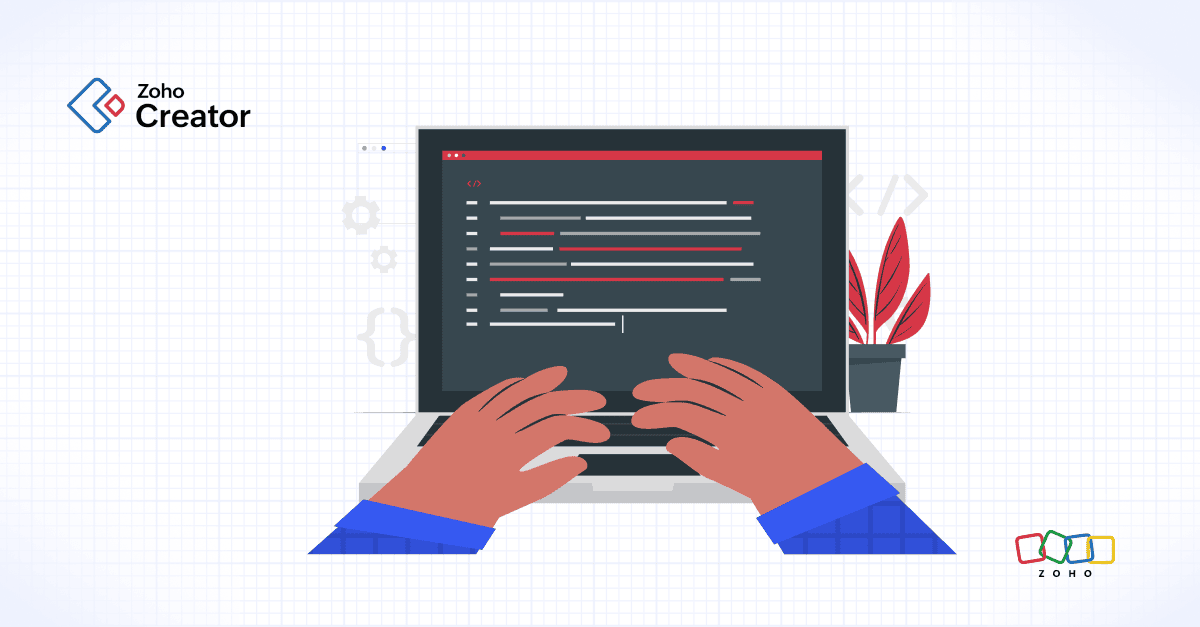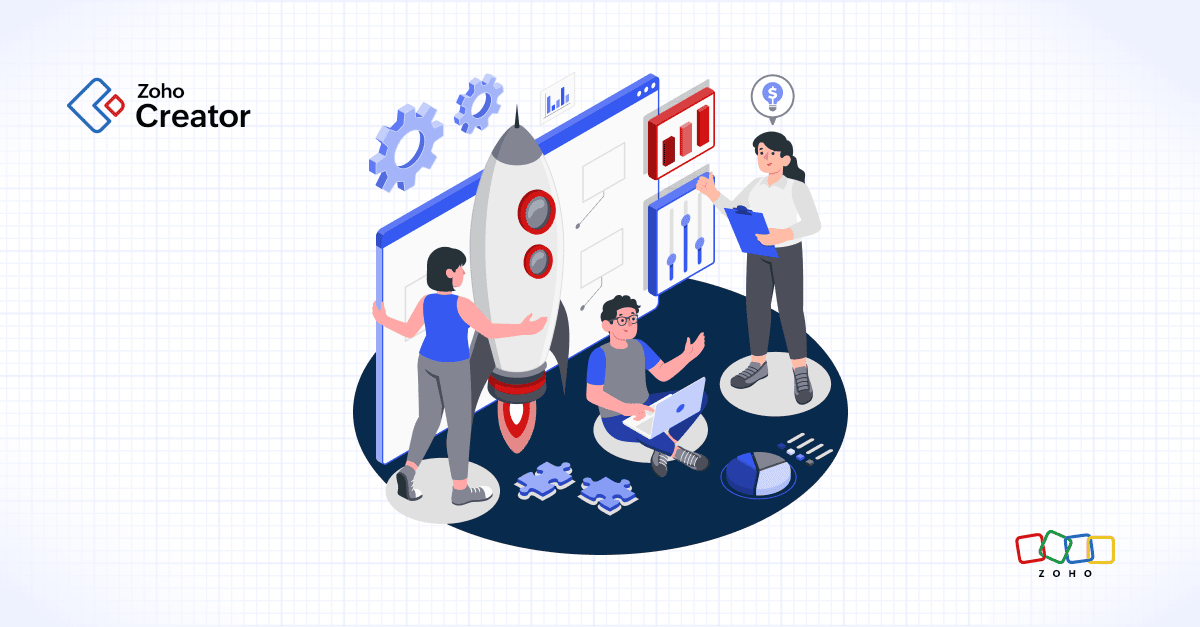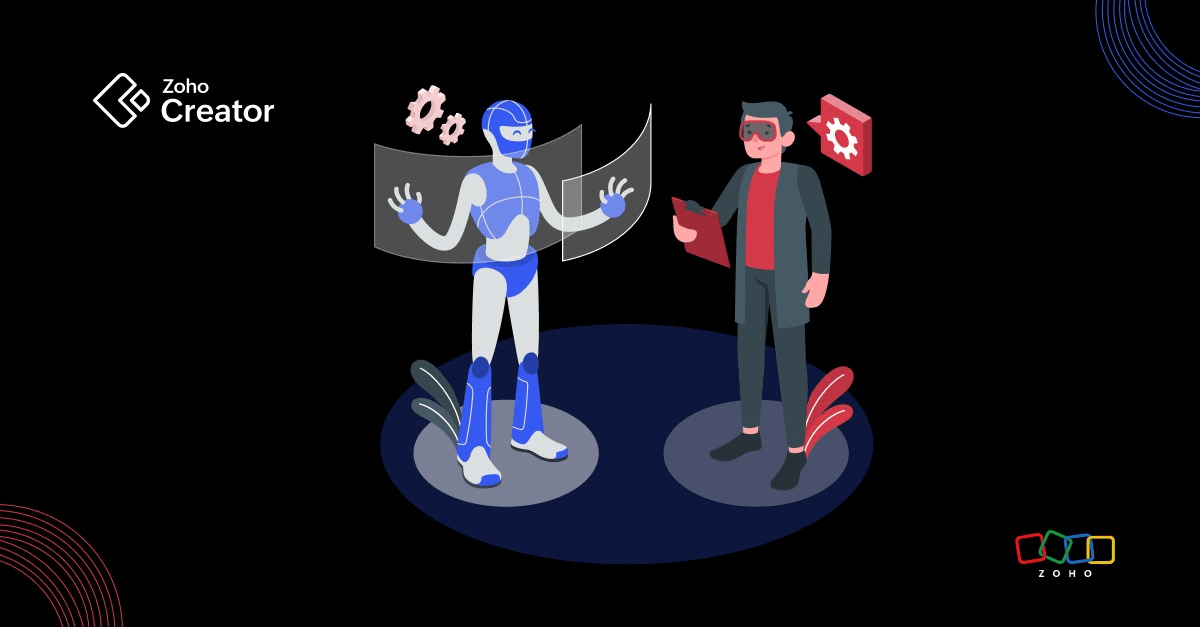- HOME
- Know Your Tech
- AI-powered app builders: Top trends and platforms
AI-powered app builders: Top trends and platforms
- Last Updated : October 30, 2025
- 367 Views
- 11 Min Read
App development has long been a complex, time-consuming process, often requiring specialized IT resources and technical expertise. For businesses, this can mean costly delays and significant reliance on developers to build, test, and deploy applications. But with the rise of AI-powered app builders, that's changing quickly.
Highlights:
- AI app builders are evolving quickly, becoming smarter and more capable of handling complex tasks with minimal user input, helping businesses create custom applications faster and more efficiently.
- Natural language processing (NLP) plays a significant role, allowing users to input simple instructions to generate sophisticated apps with minimal technical knowledge.
- Increased automation extends to both frontend and backend, offering advanced capabilities like data modeling, API connections, and security setup, all without coding expertise.
- Integration with cloud systems and enterprise tools enables seamless data flow across various platforms, enhancing scalability and performance.
AI is now set to change how businesses create custom applications, making the process faster, more efficient, and accessible to teams without deep coding knowledge. Imagine being able to design apps in a fraction of the time, with tools that can handle everything from integrating code to optimizing user interfaces, all without relying heavily on IT departments. While we're not yet at full autonomy, these AI tools are making significant strides, automating tasks that once required extensive manual work.
This blog post will explore how AI app builders are evolving, what businesses can expect in the near future, and how these tools will help you simplify app development. The future of app building is already here. Let's explore how you can stay ahead of the curve.
What are AI app builders?
AI app builders are platforms powered by artificial intelligence that enable businesses to create custom applications with little to no coding. These tools utilize technologies like machine learning (ML), natural language processing (NLP), and generative algorithms to automate various aspects of the app development process. This includes designing user interfaces, managing data structures, automating backend logic, and ensuring scalability and maintainability.
As these platforms continue to evolve, they are taking on increasingly complex development tasks and further simplifying workflows. These platforms are playing an increasingly important role in simplifying app development and making it more accessible.
Reflecting this demand, the global AI app development market is projected to grow from USD 40.3 billion in 2024 to USD 221.9 billion by 2034, with a compound annual growth rate (CAGR) of 18.6%. North America, led by the United States, currently holds the largest market share at approximately 38%, or USD 15.31 billion in 2024.
Key trends in AI app builders
AI app builders will stop being just tools for development and become strategic assets that adapt to your company’s growth in real time. Rather than waiting for instructions, they’ll actively reshape themselves, using past data and trends to suggest innovations that align with your goals.
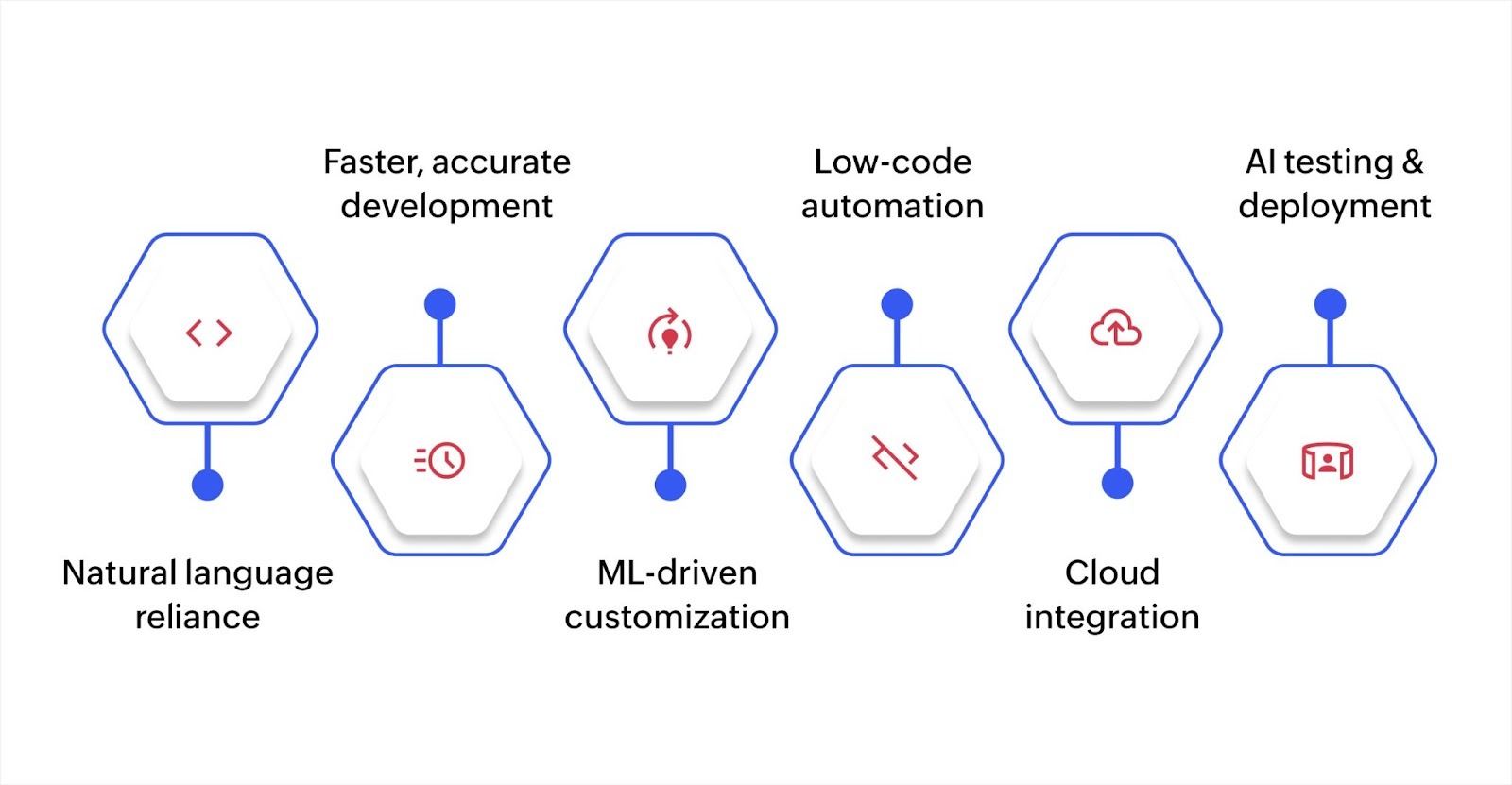
Increased reliance on natural language prompts
Natural language processing (NLP) continues to be an important feature in AI app builders. This technology enables users to input simple English instructions, and the platform generates an app that interprets these commands, building the user interface (UI), backend, and core functionality.
As AI models continue to improve, these platforms handle more complex prompts, enabling the creation of sophisticated apps with minimal user input.
Example of prompt-based app development
Consider a business that needs a task management system for its team. Instead of spending weeks with developers, a user can simply describe their requirement:
"Create a task management application where team members can create and assign tasks to colleagues. Include fields for task title, description, priority level (low, medium, high), due date, assigned team member, and status (not started, in progress, completed). Add a dashboard that shows all tasks grouped by status, displays overdue tasks in red, and shows each team member's workload. Send automatic email reminders to assignees two days before the due date and when a task becomes overdue. Include filters to view tasks by priority, assignee, and date range."
The AI app builder interprets this detailed prompt and generates a complete application, including:
- A form with all specified fields and validation.
- A database structure to store task records and team member information.
- A visual dashboard with task cards organized by status.
- Automated email workflows for reminders and overdue notifications.
- Filter functionality for task analysis and team workload management.
With Zoho Creator, you can use AI to transform such natural language descriptions into working applications. The AI handles UI design, data relationships, workflow automation, and even suggests optimizations based on best practices. Users can then refine the app further with additional prompts or use the visual interface to make adjustments.
This approach significantly reduces development time from weeks to hours, making app creation accessible to business users, operations teams, and citizen developers who understand their requirements but lack coding expertise.
Faster development and higher accuracy
A study showed that developers using AI pair programming tools completed tasks 55.8% faster than those who didn't, demonstrating the productivity gains that AI-driven development offers.
AI platforms use deep learning algorithms to interpret user inputs more accurately, creating fully functional applications without requiring manual coding for every feature. This speed increase also extends to testing, deployment, and scaling.
Enhanced customization through machine learning
AI app builders incorporate more machine learning (ML) models to improve the customization options available. These platforms learn from each user's input, refining the way they generate apps based on data from previous projects.
This means the platform better understands your unique business needs, allowing for higher levels of customization, even without direct programming. The system provides real-time prompts that respond to your specifications, enhancing both flexibility and accuracy.
No-code and low-code functionality with advanced backend automation
Today’s no-code and low-code AI app builders are becoming stronger, offering not only front-end UI generation but also advanced backend automation. The AI automatically generates data models, sets up API connections, and implements authentication systems, ensuring the app is fully functional right from the start.
A great example of this evolution is Zoho Creator, an AI-powered low-code application development platform that allows businesses to build custom, enterprise-ready apps without writing complex code. Zoho Creator combines a simple drag-and-drop interface with powerful backend tools, making it easy to automate workflows, manage data, and connect with other services.
As platforms like this continue to evolve, they are helping bridge the gap between technical and non-technical users in the app development process. The platform remains accessible to non-technical users and citizen developers, while also offering advanced capabilities through scripting languages like Deluge for those who want to fine-tune backend logic and create complex workflows.
Integration with cloud and enterprise systems
AI-powered app builders are offering more seamless integration with cloud infrastructure and enterprise tools. Businesses can now connect their applications with systems like ERP, CRM platforms, and cloud-based storage services with minimal setup. These integrations are essential for maintaining data consistency and ensuring that apps function smoothly within larger business ecosystems.
Many modern platforms also support connections to widely used tools such as Google Workspace, Salesforce, and Microsoft Dynamics. For instance, Zoho Creatoroffers effortless integration through 800+ application ecosystems and 1,000+ tools through APIs and integration flows. This includes compatibility with services like Zoho CRM, SAP, and other major enterprise platforms, making it easier to automate workflows and ensure smooth data exchange across systems.
In addition, backend architectures are increasingly optimized for distributed cloud environments. Whether it is handling large volumes of data, running real-time analytics, or supporting high user traffic, AI app builders are evolving to meet enterprise-scale demands while keeping integration intuitive and manageable.
AI-driven testing and deployment
AI app builders include automated testing and AI-driven deployment tools that scan the code for bugs and vulnerabilities before the app goes live. The platform uses machine learning algorithms to learn from previous projects, identifying potential issues based on historical data.
Deployment is more automated, with the AI automatically adjusting for performance, server load, and database configurations to optimize app performance in real time.
With these advancements, AI app builders shift from basic automation to becoming true partners in the app development process. They’re increasingly capable of anticipating your needs and offering solutions that are more tailored and efficient, turning complex tasks into automated outcomes.
What makes the best generative AI app builder?
As AI app builders evolve into strategic development partners, here are the core features that set the best platforms apart:
- Natural language understanding that accurately turns prompts into functional applications.
- End-to-end automation including backend setup, API integration, and secure authentication.
- Customizability, allowing both no-code convenience and developer-level control.
- Cloud-native scalability with integrations into business systems like CRM and ERP.
- Strong security and compliance including encryption, access controls, and regulatory alignment.
These capabilities ensure your app builder can support rapid development today and scale effectively as your business grows.
Top 5 AI app builders and platforms
AI app builders are no longer just convenience tools. They have become creative collaborators who help businesses turn ideas into working software faster than ever before. They handle technical complexity behind the scenes and adapt to the unique workflows of your team.
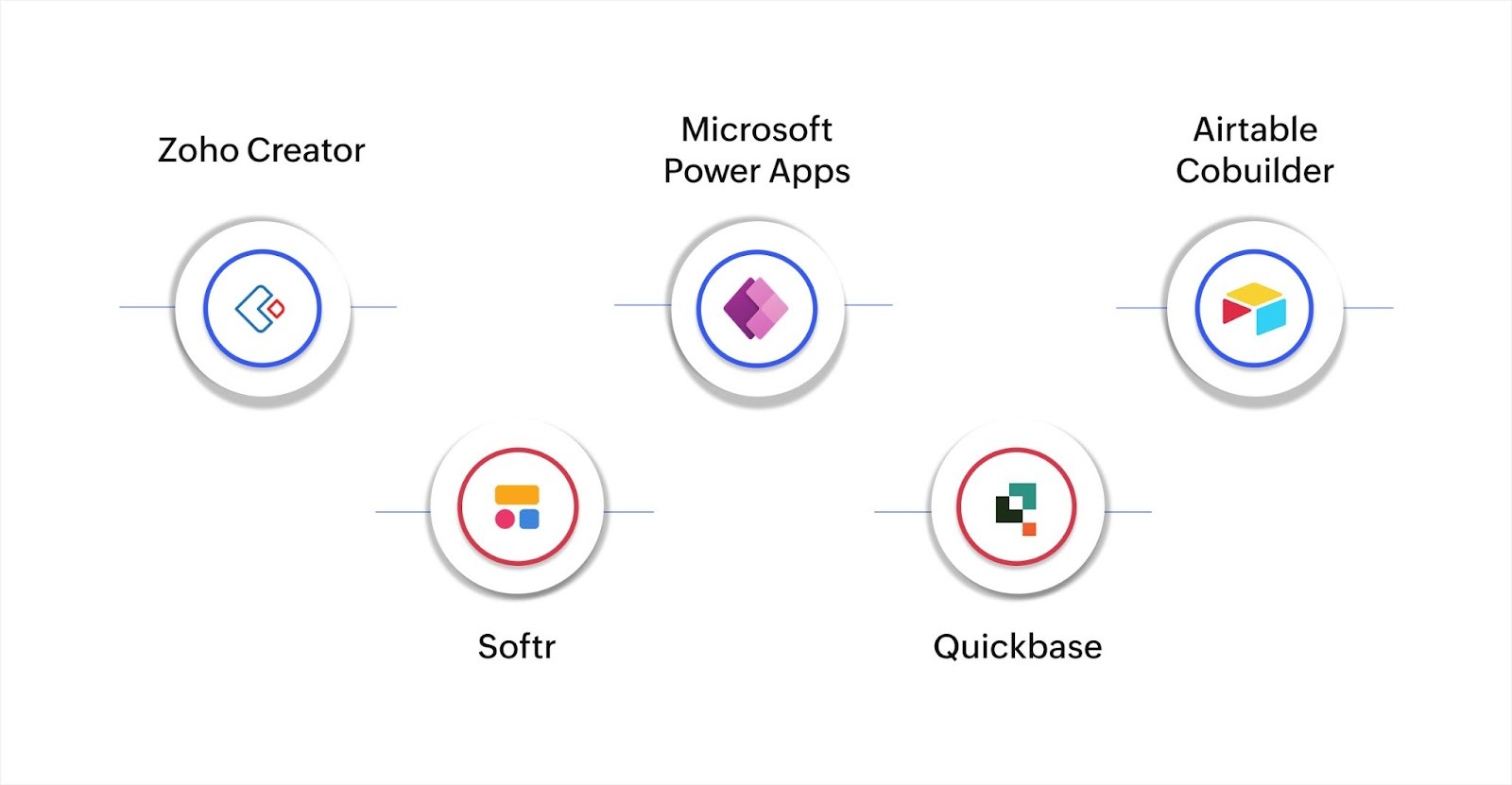
This list highlights five standout AI app builders that are redefining software development. Each platform offers a distinct approach to intuitive design, striking a balance between flexibility and simplicity. From business managers to professional developers, these tools are helping users bring real solutions to life without requiring deep coding expertise.
Zoho Creator
Zoho Creator is an AI-powered low-code application development platform known for its combination of customization, scalability, and ease of use. It allows businesses to build applications without needing extensive coding knowledge. Here's why it's a strong option.
- Minimal code, maximum customization: Zoho Creator offers a low-code environment, enabling users to design custom applications that meet their specific business needs without requiring advanced programming skills.
- Automation: The platform helps automate workflows, reducing manual tasks and making business processes more efficient.
- Integration: Zoho Creator integrates seamlessly with other Zoho products, including Zoho CRM, Zoho Analytics, and Zoho Books. It also supports integrations with third-party services via APIs and tools like Zapier.
- Cross-platform compatibility: Applications created with Zoho Creator are mobile-responsive and accessible on desktops, tablets, and mobile devices, allowing easy access on the go.
- Custom dashboards: Users can create customizable dashboards and reports to track business data and make informed decisions.
- Security: Zoho Creator offers features like role-based access control, two-factor authentication, and data encryption to protect your business data.
- Scalability: From small businesses to large enterprises, Zoho Creator adapts to growing needs and can support applications of varying complexity as business requirements evolve.
- Collaboration: The platform supports team collaboration, allowing multiple users to work on applications and workflows simultaneously.
- AI integration: You can integrate AI-powered features such as predictive forms and smart suggestions to improve decision-making and app functionality.
- Deployment: Once an app is built, Zoho Creator makes it easy to deploy across the web or mobile devices.
With these features, Zoho Creator is a solid choice for businesses looking to build custom applications and automate processes with minimal IT support.
Softr
Softr offers a user-friendly interface, making it ideal for businesses that need to build applications quickly. Here's why it stands out.
- Ease of use: Softr's drag-and-drop interface makes app development accessible, even for users with no technical background.
- Integration: The platform supports integration with tools like Airtable, Stripe, and Zapier, allowing users to connect their apps to other services.
- Limitations: While Softr is great for basic applications, it may not offer the level of customization or scalability that larger businesses or more complex projects require.
Softr is best suited for SMBs that need a simple solution to quickly build applications, but it may not be suitable for businesses with complex or highly specific needs.
Microsoft Power Apps
Microsoft Power Apps is known for its flexibility and deep integration with Microsoft services. Here's what it offers.
- Advanced features: Power Apps provide powerful tools for workflow automation, data modeling, and AI integration.
- Integration: It integrates seamlessly with Microsoft products like Office 365, Azure, and Dynamics 365, making it a great choice for businesses already using Microsoft tools.
- Setup complexity: Power Apps can be complex to set up, and it may require IT resources to fully utilize its capabilities. Smaller businesses without dedicated IT teams may find it challenging.
If you are already using Microsoft services and need a flexible, feature-rich solution, Power Apps is a good option. However, it may be more suitable for larger organizations with dedicated technical resources.
Quickbase
Quickbase is a cloud-based AI app builder focused on business process management and external data integration. Here are the key features.
- Business process automation: Quickbase helps automate workflows, making it easier to manage processes and tasks across departments.
- External data integration: It integrates with a wide range of third-party tools, databases, and cloud services, enabling businesses to simplify their data across multiple platforms.
- Complex setup: Similar to Power Apps, Quickbase may require technical expertise to fully set up and customize according to business needs.
Quickbase is ideal for businesses that need to automate complex workflows and manage large volumes of data. However, it may not be the best choice for smaller businesses or those without dedicated IT support.
Airtable Cobuilder
Airtable Cobuilder is known for its intuitive design tools and data visualization capabilities. Here's why businesses choose Airtable.
- Data visualization: Airtable offers powerful tools for visualizing data, helping businesses identify trends and patterns in their operations.
- Intuitive design tools: It provides an easy-to-use interface for creating and customizing workflows, making it ideal for teams that need to organize data and automate tasks without a steep learning curve.
- Limitations for complex applications: While Airtable is great for data-driven apps, it may not support the complex customizations required for large-scale applications or enterprises.
Airtable Cobuilder is ideal for businesses that need to manage and visualize data, but it may not be the best option for those seeking advanced features or enterprise-level functionality.
With these options in mind, you can select an AI app builder that best fits your company's size, resources, and specific requirements. From simple, no-code platforms to advanced, enterprise-level solutions, there's a tool for every business looking to improve efficiency and drive innovation. The right platform will enable your team to build and scale applications that support your long-term goals.
Build smarter apps with the power of AI and low-code
App development is undergoing a fast transformation. Businesses are increasingly seeking smarter ways to solve challenges, respond to change, and develop custom applications without the complexity of traditional coding. AI-powered app builders are at the forefront of this shift, offering tools that reduce reliance on IT teams and accelerate digital progress.
Zoho Creator stands out as a feature-packed AI-powered low-code platform that helps businesses create custom applications with ease. Its simple interface and AI capabilities let you automate tasks, integrate data, and offer insights, making app building easy for both technical and non-technical users. Zoho Creator grows with your business, adjusting to new needs without needing significant redevelopment.
By using Zoho Creator, businesses can quickly create applications that improve efficiency and encourage innovation.
Ready to build apps that grow with your business? Sign up for free today and discover how Zoho Creator can help you build custom applications to meet your needs.
FAQ
How do AI-powered app builders handle updates and maintenance?
AI-powered app builders typically automate maintenance tasks, including updates for security patches and performance improvements. These platforms often have built-in features that enable automatic updates, reducing the need for manual intervention. This ensures your applications remain secure and up to date without requiring extensive IT resources.
Can non-technical users fully utilize AI app builders?
Yes, many AI-powered app builders are designed with no-code or low-code functionality, making them accessible to non-technical users. With intuitive interfaces and simple drag-and-drop features, business owners and managers can create custom applications without needing to know programming. These tools enable users to automate workflows, create custom dashboards, and even integrate data from various sources with minimal technical expertise.
Are AI app builders suitable for enterprise-level applications?
Yes, many AI app builders are designed to scale with growing businesses, making them suitable for enterprise-level applications. These platforms often offer advanced features such as complex backend automation, integration with enterprise systems (like ERP and CRM), and cloud-based scalability. However, it's important to evaluate the platform’s capabilities to ensure it meets the specific needs of large-scale operations.
 Bharathi Monika Venkatesan
Bharathi Monika VenkatesanBharathi Monika Venkatesan is a content writer at Zoho Creator. Outside of work, she enjoys exploring history, reading short novels, and cherishing moments of personal introspection.

